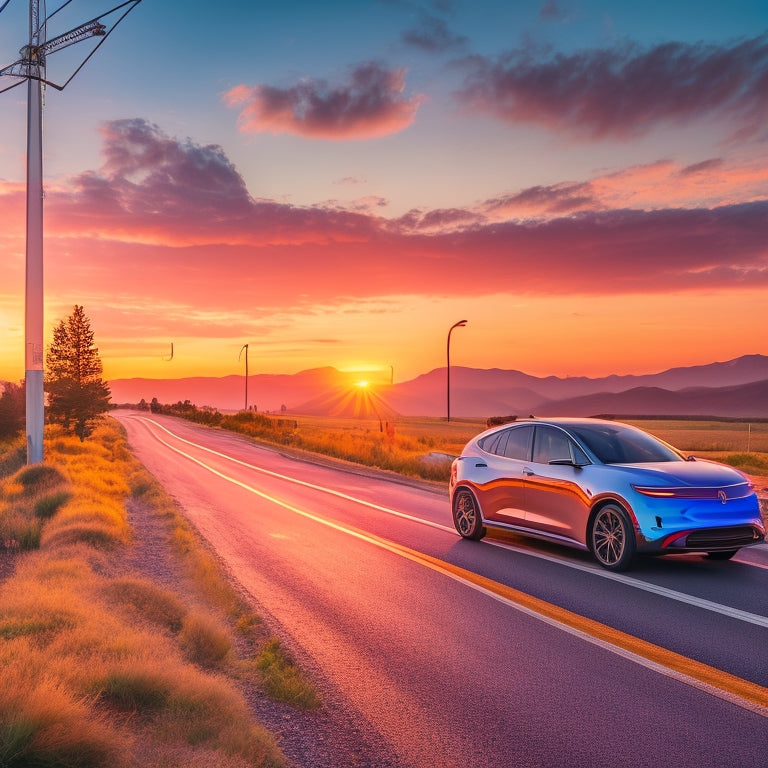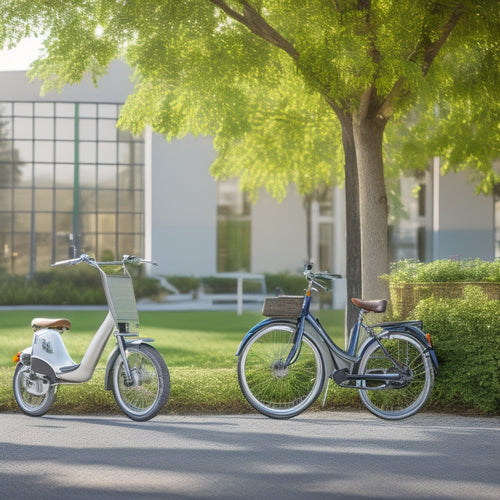
Best Vehicle Chargers to Keep You Moving
Share
You're looking for a reliable vehicle charger to keep your devices powered up and stay connected on the go. Solar chargers are a great option, harnessing the sun's energy for eco-friendly power. Top-rated options include the Anker PowerPort Solar Lite and Goal Zero Nomad 7, offering high efficiency and durable designs. Prioritize rapid recharging for safety, and consider factors like wattage, voltage, and ampere output. For affordable and durable solutions, look for waterproof, foldable designs with high-quality mounting systems. Now, explore the best vehicle chargers for your needs and discover the perfect blend of performance and value.
Key Takeaways
• Look for top-rated solar chargers with high efficiency, waterproof, and durable designs for off-grid adventures and roadside emergencies.
• Consider portable solar panel chargers with high wattage, voltage, and ampere output, and features like foldable designs and charge controllers.
• Prioritize rapid recharging for safety with high-power outputs and smart charging that adjusts speeds for best performance.
• Durable solar panels with high IP ratings for water and dust resistance, and quality mounting systems, are essential for off-grid adventures.
• Installation tips include proper positioning, orientation, and angle adjustments for optimal energy harvesting, along with durable mounting systems and careful cable management.
Top Rated Solar Chargers for Vehicles
When you're on the move, harnessing the sun's energy with a top-rated solar charger for your vehicle can be a game-changer, providing a reliable and eco-friendly power source for your devices and gadgets.
Whether you're setting off on off-grid adventures or simply need a backup plan for roadside emergencies, a solar charger can be a lifesaver. By tapping into the sun's energy, you can keep your devices charged and stay connected, even when you're far from a power outlet.
With a top-rated solar charger, you can power up your smartphone, laptop, or other essential devices, giving you peace of mind on the road. Look for a charger that's designed specifically for vehicles, with features like waterproofing, durability, and adjustable mounting options.
Portable Solar Panel Chargers Ranked
Now that you've considered the benefits of harnessing the sun's energy for your vehicle, it's time to evaluate the top portable solar panel chargers on the market, ranked for their efficiency, durability, and overall performance. As you map out your Solar Roadmap, it's crucial to select a portable charger that fits your camping essentials and meets your energy needs.
Here's a comparison of the top three portable solar panel chargers:
| Charger | Efficiency Rating |
|---|---|
| Anker PowerPort Solar Lite | 22.5% |
| Goal Zero Nomad 7 | 20.5% |
| Renogy E.Flex | 21.5% |
When choosing a portable solar panel charger, consider the wattage, voltage, and ampere output to make sure it's compatible with your vehicle's battery. Additionally, look for features like waterproofing, foldable designs, and built-in charge controllers for added convenience. By selecting the right portable solar panel charger, you'll be well on your way to a sustainable, off-grid adventure.
High Efficiency Vehicle Chargers Tested
You'll want to test high-efficiency vehicle chargers that can rapidly recharge your batteries, especially when you're far from a power outlet. This is important for vehicle safety, as a dead battery can leave you stranded. To make sure you're prepared, we've tested several high-efficiency vehicle chargers that prioritize rapid recharging and innovative charger design.
Here are the key takeaways from our testing:
-
Rapid Recharging: Look for chargers with high-power outputs (measured in amps) to quickly top off your batteries.
-
Smart Charging: Chargers with built-in sensors and algorithms can detect battery health and adjust charging speeds for best performance.
-
Durable Construction: A charger's design and build quality can have a significant impact on its lifespan; seek out chargers with rugged, weather-resistant materials.
Affordable Solar Charging Solutions Found
Solar panels can be an attractive alternative to traditional charging methods, especially for those who frequently drive in areas with abundant sunlight, as they offer a clean, renewable energy source that can trickle-charge your vehicle's batteries.
As you mull over switching to solar, you'll appreciate the Solar Savings that come with harnessing the sun's energy. With a solar panel setup, you can reduce your reliance on traditional fuel sources, saving you money in the long run.
For those who love Off Grid Adventures, solar panels are a game-changer. Imagine being able to explore remote areas without worrying about running out of juice. With a solar panel system, you can top off your batteries while parked, ensuring you're always ready to hit the road. Plus, many solar panels are designed to be portable and compact, making them easy to take with you on the go.
When shopping for an affordable solar charging solution, look for systems that are specifically designed for vehicles. These systems typically include a solar panel, charge controller, and mounting hardware. Be sure to ponder factors like panel efficiency, durability, and warranty when making your decision.
With the right solar charging solution, you'll be ready to take on any adventure that comes your way.
Best Selling Vehicle Solar Panels Today
When selecting a vehicle solar panel, you're likely to find that top-selling options share some common characteristics, such as high-efficiency cells and rugged construction. These features enable you to harness the power of the sun efficiently, even on your most ambitious Off Grid Adventures.
With the latest Solar Panel Innovations, you can trust that your vehicle will stay powered up, no matter where the road takes you.
Here are some key features to look for in the best-selling vehicle solar panels today:
- High-efficiency cells: Maximizing energy output and minimizing space requirements
- Rugged construction: Withstanding harsh outdoor conditions and rough handling
- Advanced charging controllers: Ensuring safe and efficient energy transfer to your vehicle's batteries
Solar Charger Capacity and Performance
When selecting a solar charger for your vehicle, you'll want to take into account the capacity and performance of the system.
You'll need to think about the power output you require, as it directly affects how quickly your battery will charge.
Additionally, you should also look into the charging speed variance and panel efficiency ratings to make sure you're getting the most out of your solar charger.
Power Output Matters
Your vehicle's charging needs dictate the required power output of your solar charger, ensuring you can replenish your batteries efficiently on the move. A charger's power output is essential, as it directly affects how quickly you can recharge your batteries. A higher power output means faster charging, but it also depends on the energy density of your batteries.
When selecting a solar charger, consider the following key factors:
-
Power Curve: A charger's power curve indicates its ability to adapt to changing sunlight conditions, ensuring the most efficient energy harvesting.
-
Energy Density: The energy density of your batteries affects how effectively they can store and release energy. A higher energy density means more power in a smaller package.
-
Maximum Power Point Tracking (MPPT): This feature enables your charger to optimize energy harvesting by tracking the maximum power point of your solar panels.
Charging Speed Variance
As you navigate the market for a solar charger, you'll encounter varying capacities and performance levels that impact charging speeds, making it important to understand how these factors influence your ability to recharge on the go.
Rapid Flux technology, for instance, enables rapid recharging during peak sun hours, while Power Surge protection prevents damage from electrical spikes.
When evaluating solar chargers, consider the capacity, measured in watt-hours (Wh), which affects how quickly your devices recharge. A higher-capacity charger will generally recharge your devices faster, but may also be bulkier and heavier. Performance levels, measured in amps (A), also impact charging speeds, with higher amps resulting in faster recharging.
To optimize your charging experience, look for chargers with adjustable output settings, allowing you to fine-tune the charging speed to your device's specific needs. Additionally, consider the charger's maximum power point tracking (MPPT) capability, which helps maximize energy harvesting during varying sunlight conditions.
Panel Efficiency Ratings
You'll want to scrutinize a solar charger's panel efficiency rating, which greatly impacts its capacity and performance, to make sure you're getting the most out of your charging experience.
A higher panel efficiency rating translates to more energy harvested from the sun, resulting in faster charging times and a more reliable power source.
When evaluating panel efficiency, consider the following key factors:
-
Conversion Efficiency: The percentage of sunlight converted into electrical energy. Look for chargers with high conversion efficiency rates (e.g., 20% or higher) for best energy harvesting.
-
Temperature Coefficient: The rate at which efficiency decreases as temperature increases. A lower temperature coefficient ensures consistent performance in varying environmental conditions.
-
Durability and Build Quality: A well-built charger with durable panels will maintain its efficiency rating over time, ensuring consistent performance throughout its lifespan.
Durable Vehicle Solar Panels Reviewed
When outfitting your vehicle for off-grid adventures, durable solar panels capable of withstanding harsh outdoor conditions are essential for reliable power generation. You need solar panels that can withstand the elements, from scorching desert heat to torrential rain and snow.
When it comes to durable vehicle solar panels, you can't compromise on quality. Look for panels with a high IP (Ingress Protection) rating, which indicates their resistance to water and dust. A higher IP rating guarantees your panels will keep functioning even in harsh environments.
Regular Solar Panel Maintenance is also important to ensure your panels perform at their best. Clean your panels regularly to remove dirt and debris that can reduce their efficiency. Additionally, consider investing in a high-quality solar panel mounting system that can withstand strong winds and vibrations.
Fastest Solar Charging Times Compared
Your solar panel's charging speed is only as good as its ability to harness sunlight efficiently, and that's why it's essential to know which models can refill your batteries the fastest.
You don't want to be stuck in the dark, relying on outdated Solar Mythbusters' tales that claim solar panels are slow. Thankfully, modern technology has shattered these Charging Records, and we've got the numbers to prove it.
Here are the top performers:
-
Renogy 100W Solar Panel: 4.5 hours to charge a 50Ah battery
-
HQST 100W Solar Panel: 4.8 hours to charge a 50Ah battery
-
Windynation 100W Solar Panel: 5.2 hours to charge a 50Ah battery
These times are based on ideal conditions, with the panels receiving direct sunlight at a peak angle. Keep in mind that real-world charging times may vary depending on your specific setup and environment.
Nonetheless, these solar panels have proven themselves to be the fastest on the market, making them ideal for adventurers and travelers who need reliable power on-the-go.
Vehicle Solar Panel Installation Tips
Properly positioning your solar panel on your vehicle's roof or hood is crucial to maximize energy harvesting and guarantee a secure installation. You'll want to take into account the orientation, angle, and shading factors to optimize energy output.
Here are some key considerations for a successful installation:
| Component | Considerations | Tips |
|---|---|---|
| Mounting systems | Durability, adjustability, and compatibility | Select a mounting system that fits your vehicle's make and model, and think about adjustable mounts for ideal angling. |
| Wiring considerations | Cable management, length, and protection | Route wires carefully to avoid damage, and use protective casing to shield from the elements. |
| Installation location | Roof or hood, and clearance | Ensure a clear path for airflow and avoid obstructing your vehicle's features, such as antennas or sensors. |
Best Value Solar Chargers for Money
Opting for the best value solar charger for your money means considering factors beyond just the upfront cost, as the most economical option may not always provide the best overall value. You want a charger that not only fits your budget but also meets your eco-friendly expectations.
When it comes to solar budgeting, you need to think about the long-term benefits, such as reduced energy bills and a lower carbon footprint.
Here are some key considerations to keep in mind:
-
Efficiency: Look for chargers with high-efficiency ratings to make sure you're getting the most out of your solar panels.
-
Durability: A durable charger can withstand harsh outdoor conditions and last longer, reducing the need for frequent replacements.
-
Certifications: Opt for chargers with certifications from reputable organizations, such as UL (Underwriters Laboratories) or ETL (Intertek), to confirm compliance with safety and performance standards.
Frequently Asked Questions
Can I Use a Solar Charger in Cloudy or Shaded Areas?
While you can use a solar charger in cloudy or shaded areas, its efficiency drops noticeably; expect reduced power output, especially on cloudy days or in heavily shaded areas, but it'll still trickle charge your device.
Are Solar Chargers Compatible With All Vehicle Types?
'You've got a million questions about solar chargers, and we're here to shed some light! When it comes to compatibility, you'll find that not all solar chargers are created equal, with vehicle limitations and charger variations playing an important role.'
How Do I Clean and Maintain My Solar Charger?
To clean and maintain your solar charger, you'll want to regularly wipe it down with a soft cloth to remove dust and debris, ensuring dust protection, and inspect the waterproof coating for any signs of wear.
Can I Charge My Vehicle's Battery While It's Still in Use?
When you're driving, you can charge your vehicle's battery, but be cautious: excessive charging can harm battery health. Take in-vehicle precautions, like monitoring voltage, to guarantee safe and efficient charging that won't compromise your battery's lifespan.
Do Solar Chargers Come With Built-In Battery Storage?
As you venture off the grid, you're wondering if solar chargers come with built-in battery storage. Typically, they don't, but Off Grid Systems often pair solar panels with separate energy storage solutions, ensuring a reliable energy capacity that's tailored to your needs.
Related Posts
-

Charge Your Ride With Renewable Energy Solutions
By immersing yourself in renewable energy sources like solar power, you can greatly diminish your carbon footprint an...
-

What Are the Best Eco-Friendly Rides for Campus?
As you navigate your college campus, you have a wide range of eco-friendly ride options to choose from, including bic...
-

What Are the Safety Certification Requirements?
You need to make sure your electric scooter meets rigorous safety certification requirements to guarantee a safe ride...


